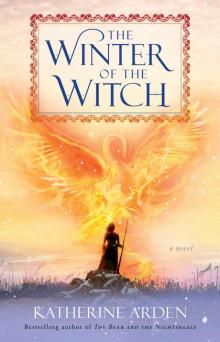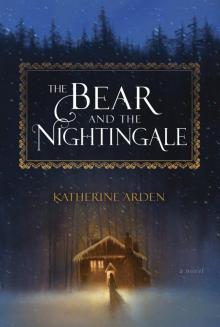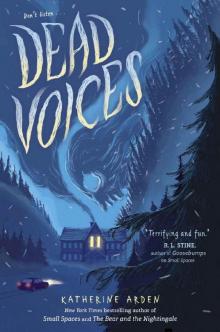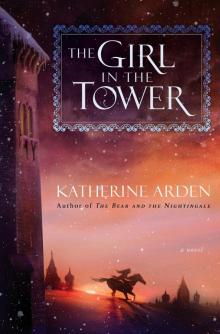- Home
- Katherine Arden
The Winter of the Witch Page 4
The Winter of the Witch Read online
Page 4
But—why should he be ashamed? God cared not for men and women. All that mattered was his own will, and she was in his power. The thought heated his blood, as much as the worship of the crowd outside. His eyes swept her body again.
“You have been condemned to die,” he told her. “For your sins. You have been granted these few moments to pray.”
Her face did not change. Perhaps she had not heard. He spoke louder. “It is the law of God, and the will of the people, whom you have wronged!”
Her face was salt-white, so that each faint freckle stood out on her nose like spots of blood. “Kill me then,” she said. “Have the courage to do it yourself, not leave it to a mob and call it justice.”
“Do you deny then that the fire was of your making?” Lightly, he stepped toward her. Free, he told himself. Free at last of her power over him.
Her expression didn’t change. She didn’t speak. She didn’t move even when he curled his fingers behind the bone of her jaw and lifted her face to his. “You cannot deny it,” he said. “Because it is true.”
She didn’t flinch when he pressed his thumb into the bruises blossoming flowerlike along her mouth. She barely seemed to see him.
She really was ugly. Big eyes, wide mouth, the jutting bones. But he could not look away. He wouldn’t ever be able to look away, not until those eyes closed in death. Perhaps even beyond she would haunt him.
“You took all that mattered from me,” he said. “You cursed me with demons. You deserve death.”
She made no reply. Tears ran unheeded down her face.
In sudden rage, he caught her shoulders, drove her against the iconostasis, so that all the saints shook, and pinned her there. The breath left her body, any vestige of color left her face. His hand closed on her throat, pale and vulnerable, and he found himself breathing fast. “Look at me, damn you.”
Slowly, her eyes focused on his face.
“Beg for your life,” he said. “Beg, and perhaps I will grant it you.”
She shook her head slowly, her eyes dazed and wandering.
He felt a surge of hatred; he bent his lips to her ear and whispered in a voice even he hardly recognized, “You will die in the fire, Vasilisa Petrovna. And you will scream for me, before the end.” He kissed her once, hard as a blow, holding her jaw in a vise-grip and tasting the blood on her split lip.
She bit him, bloodying his mouth in turn. He recoiled, and then they were staring at each other, with the hatred of each mirrored in the other’s eyes.
“God go with you,” she whispered, in bitter mockery.
“Go to the devil,” he said, and left her.
* * *
SILENCE FELL IN THE DUSTY CHAPEL, after Konstantin left. Perhaps they were building a pyre, perhaps they were readying something worse. Perhaps her brother would come at last, and this nightmare would be over. Vasya didn’t care. What had she to fear, in dying? Perhaps, beyond life, she would find her father again, her mother, her beloved nurse Dunya.
Solovey.
But then she thought of fire, of whips and knives and fists. She was not dead yet; she was terrified. Perhaps she could just—step away—walk into the gray forest beyond life and be gone. Death was someone she knew.
“Morozko,” Vasya whispered, and then his older name, the name of the death-god, “Karachun.”
No answer. Winter was over; he had faded away from the world of men. Shivering, she sank to the floor, leaned against the iconostasis. Outside people shouted, laughed, swore. But in that chapel, there was only the silence of the saints in the icon-screen, staring steadily down. Vasya could not bring herself to pray. Instead she tipped her aching head back and shut her eyes, measuring out her life in heartbeats.
She could not have slept, not there. Yet somehow the world faded away and she found herself walking once more in the black forest beneath a starry sky. She knew a dim, shocked relief. It was over. God had heard her plea; this was what she longed for. She stumbled forward, calling.
“Father,” she cried. “Mother. Dunya. Solovey. Solovey!” Surely he would be here. Surely he had waited for her. If he could.
Morozko would know. But Morozko wasn’t there; only silence met her cry. She struggled on, scrabbling, but her limbs were so heavy, and her ribs hurt worse and worse with every breath.
“Vasya.” He called her name twice before she heard. “Vasya.”
She tripped and fell before she could turn, found herself kneeling in the snow without the strength to rise. The sky was a river of stars, but she didn’t look up. The death-god was the only thing she could see. He was little more than a confluence of light and dark, wispy as cloud across the moon. But she knew his eyes. He was waiting for her, in the gray forest. She was not alone.
Between gasps she managed, “Where is Solovey?”
“Gone,” he said. There was no comfort in the death-god, not here; there was only the knowledge of her loss, echoed in his pale eyes.
She did not know such a sound of agony could come from her throat. Mastering it, she whispered, “Please. Take me with you. They are going to kill me tonight and I do not—”
“No,” he said. The faintest of pine-tinged breezes seemed to touch her bruised face. He wore his indifference like armor, but it was wavering. “Vasya, I—”
“Please,” she said. “They killed my horse. There is only the fire now.”
He reached out to her, just as she reached back, through whatever memory or illusion or walls divided them, but it was like touching a wisp of mist.
“Listen to me,” he said, mastering himself. “Listen.”
She lifted her head with effort. Why, listen? Why couldn’t she just go? But the bonds of her body called her; she could not win free. The faces of the icons seemed to be trying to break in upon her sight and come between them. “I wasn’t strong enough,” he said. “I have done what I could; I hope—it may be enough. You won’t see me again. But you will live. You must live.”
“What?” she whispered. “How? Why? I am about to—”
But icons were thrusting themselves before her eyes, more real than the faint death-god. “Live,” he said to her again. And then he was gone a second time. She was awake, alone, lying on the cold, dusty floor of a church, still, horribly, alive.
Alone, save for Konstantin Nikonovich. He was saying, over her head, “Get up. You have missed your chance to pray.”
* * *
HER HANDS WERE ROUGHLY bound behind her back; a few men came up at Konstantin’s beck and made a square around her. They weren’t anything like soldiers; they were peasants or tradesmen, ruddy and determined. One held an ax, another a scythe.
Konstantin’s face was white and set; their eyes met once, in a look of pure violence, before he looked away, serene, his lips set in the austere lines of a man doing his duty to his faith.
The crowd was thick about the chapel, lining the road that wound down to the river. They had torches in their hands. They smelled like cooking and char and old wounds and sweat. The nighttime wind scoured her skin. They took away her shoes—for penitence, they said. Her feet scraped and throbbed on the snow. Triumph in their faces; naked worship of the priest, naked hatred of her. They spat on her.
Witch, she heard again and again. She set fire to the city. Witch.
Vasya had never been so frightened. Where was her brother? Perhaps he could not get through the mob; perhaps he feared the people’s madness. Perhaps Dmitrii thought her life a small price to quiet his raging city.
She was prodded forward, stumbling. Konstantin walked beside her, head piously bent. The red light of the torches leaped before her eyes and blinded them.
“Batyushka,” she said.
Konstantin broke off. “Beg me now?” he breathed, below the roar of the crowd.
She did not speak; she had all she could do to fight the panic that was threateni
ng to madden her. Then she said, “Not like this. Not—in fire.”
He shook his head, and gave her a half-smile; quick, almost confiding. “Why? Did you not condemn Moscow to burn?”
She said nothing.
“The devils whispered,” said the priest. “At least I can get some good of your curse; the devils spoke true. They whispered of a maiden with a witch’s gifts, and a monster all of fire. I didn’t even have to lie, when I told the people of your crime. You should have thought of that before you cursed me with the ears to hear them.”
With visible effort, he turned away from her and resumed his praying. His face was the color of linen, but his steps were steady. He seemed transfixed by the crowd’s rage, consumed by what he himself had summoned.
Vasya’s vision took on a black-and-white clarity, grim and shocking. The air was cold on her face; her feet burned as they began to freeze in the snow. Moscow’s smoke-tinged air ran quicksilver through her veins, drawn in with each panicked breath.
Before her, on the ice of the Moskva, massed a sea of upturned faces, snarling or weeping, or merely watching. Down on the river stood a stack of logs, illuminated on all sides with torches. A pyre, hastily constructed. And atop it, stark against the sky, the cage of the condemned, lashed down with many ropes. The crowd made a low, continuous sound now, like the growl of an animal rising.
“Forget the cage,” Vasya said to Konstantin. “These people will tear me to pieces before I get there.”
The look he gave her was almost pitying, and she suddenly understood why he walked beside her, why also he prayed with that calculated grace. This was Lesnaya Zemlya writ large; he had gathered them up in their grief and terror, gathered them into his hand with his golden voice and his golden hair, so that they became a weapon in his grip, a tool of vengeance, and a sop to his pride. They would not attack while he was with her, and he wanted to see her burn. He had been cheated of it, after all, the night before. Always, always she had underestimated the priest.
“Monster,” she said, and he almost smiled.
Then they were down on the ice itself. A shriek went up like a dozen dying rabbits. The people were pressing close about her now, spitting and striking. Her guards could barely keep them back. A stone came whistling through and cut her cheek, gashed it deep. She put a hand to her face and blood spilled through her fingers.
Dazed now, she twisted her head one more time to look at Moscow. No sign of her brother. But she saw the devils, despite the dark. They were silhouetted atop roofs and walls: domoviye and dvoroviye and banniki, the faint house-spirits of Moscow. They were there, but what could they do but watch? Chyerti are formed of the currents of human life; they ride them, but they do not interfere.
Except two. But one was her enemy, the other was far away, made nearly powerless by spring and by her own hand. The most she could hope for from him was a death without agony. She held that hope in a desperate grip as they prodded and shouted and chivied her toward the pyre. Across the ice, through a narrow corridor in the throng. Tears poured down her face now, from her own helplessness, and an involuntary reaction against their hatred.
Perhaps there was some justice in it. Again and again, she saw folk limping, burned, with bandages on their arms or faces. But I did not mean to free the firebird, she thought. I did not know what would happen. I did not know.
The ice was still hard, as thick as a man was tall, shining in spots where wind or sledges had swept away the snow. It would be a long time still until the river released its bonds. Will I live to see it? Vasya wondered. Will I feel sun on my skin again? I think not, I think—
The crowd ebbed and surged around the pyre. Konstantin’s golden hair turned gray-silver in the torchlight, his face a maelstrom of triumph, anguish, lust. His voice and his presence were undiminished, but now his power was divorced from the restraining impulses of religion. Vasya wished suddenly that she could warn her brother, warn Dmitrii. Sasha, you know what he did to Marya. Do not trust him, do not—
Then she thought: Sasha, where are you?
But her brother was not there, and Konstantin Nikonovich was bending his eyes down to hers for the last time. He had won.
“What will you say to the God you despise,” Vasya whispered, breathing short and thin with fear, “when you go into the darkness? All men must die.”
Konstantin only smiled at her again, lifted his hand to make the sign of the cross, raised his deep voice to intone a prayer. The crowd fell silent to hear him. Then he bent forward to whisper in her ear. “There is no God.”
Then they were dragging her up, and she was struggling like a wild thing in a trap: pure instinct, but the man was stronger than she was, and her arms were bound, the blood ran down her fingertips where the ropes bit into her thrashing wrists. They forced her up, and Vasya thought, Mother of God it is happening.
Dying, she thought, ought to bring some sense of completion, of a journey ended. But this was just being caught out of life, as she was, with all her sweat and tears and terrors, her wishes and regrets.
The cage was small enough that she would have to crouch inside it. A blade at her back prodded her forward. The barred wooden door slammed, was tied securely shut.
Vasya’s sight fractured with fear. The world became a series of disjointed impressions: the black, fire-lit mass of the crowd; a last glimpse of sky; and memories, of her childhood in the forest, of her family, of Solovey.
The men were tossing torches onto the wood. Smoke billowed, and then the first log caught, crackling. For an instant, her eyes found the stark-white face of Konstantin Nikonovich. He lifted his hand. The hunger, the grief, the joy in his gaze was for her alone. Then a curl of smoke blotted him out.
She wrapped both hands around the bars. Splinters stabbed into her fingers. The smoke stung her face and set her coughing. Somewhere dim and far away, she thought she heard hoofbeats, new voices calling, but they were in another world; her world was made of fire.
Many say, better to die, until the time comes to actually do it, Morozko had told her once. He was right. The heat was already unbearable. But he was nowhere to be seen; there was no refuge for her yet in the forest beyond life.
She couldn’t breathe.
My grandmother came to Moscow and never left. Now it is my turn. I am never going to leave this cage. I will be ash on the wind, and I will never see my family again…
Rage filled her suddenly; it opened her eyes, sent her back, crouching, to her feet. Never? All those hours, those memories stolen by one mad priest, who had seen his chance for vengeance and taken it? Would they say of her one day, She never left; her tale ended there on the ice? And what of Marya? Brave, doomed Marya? Perhaps Konstantin would turn on her next, the witch-child who knew his crime.
There was no way out. She was crouched on the floor of a locked cage, flames rising all around, burning her already-blistered face. There was no way out, save by dying. The cage would not break. It was impossible.
Impossible.
Morozko had said that when she dragged him against hope into the inferno that was Moscow.
Magic is forgetting the world was ever other than as you willed it.
On a surge of blind will, Vasilisa Petrovna set her hands onto the thick, burning-hot bars of her cage, and pulled.
The heavy wood broke apart.
Vasya clung, disbelieving, to the new-made gap. Her vision was graying. The cage smoldered; beyond hung a curtain of fire. What matter if she’d broken the bars? The fire would take her. If by some miracle it did not, then she’d be torn apart by the crowd.
But still she crawled out of the cage, put her hands, then her face, into the fire, got to her feet. An instant she stood there, wavering, beyond fear, untouched by the flames. She’d forgotten they could burn her.
And then she leaped down.
Down through the flames of her own funeral py
re; she struck the snow and rolled, sweating, sooty, bloody. A soundless cry went up from all the watching chyerti. She was blistered, but not on fire.
Alive.
Vasya scrambled up, looking wildly about her, but no one cried out; Konstantin—everyone—was still watching the fire, as though she had not come hurtling down at all. It was like being a ghost. Was she dead? Had she fallen into another world, like a devil that could not touch the earth, but only live above or beneath it? Dimly, she thought she heard the sound of hoofbeats getting louder, thought she heard a familiar voice shouting her name.
But she didn’t heed. For a different voice spoke, low and amused, seemingly in her ear. “Well,” it said, “I thought I was beyond surprising.”
And then it laughed.
* * *
VASYA WHIPPED HER HEAD AROUND, fell sprawling into the melted slush. The haze of smoke choked her; the air rippled like cloth in the heat, made formless shadows of the ring of people. Still they didn’t see her. Perhaps she had died, or fallen in truth into a world of devils. She couldn’t feel her wounds, only her weakness. Nothing seemed real. Certainly not the man standing over her.
Not a man. A chyert.
“You,” she whispered.
He stood too close to the fire and should have been scorched, but wasn’t. His single eye glittered in a face seamed with blue scars.
The last time she’d seen him, he had killed her father.
“Vasilisa Petrovna,” said the chyert called Medved.
Vasya lurched to her feet, caught between the devil and the fire. “No. You’re not here, you cannot be here.”
He did not answer in words, but caught her chin in his hand, tilted her face up to his. The lid of his missing eye was sewn shut. His thick fingers smelled of carrion and hot metal and were quite real. He grinned down at her. “No?”
She wrenched back, wild-eyed. There was blood from her split lip on his fingers; he licked it off and added, confidingly, “Tell me: how long do you think your newfound power will avail you?” He cast an appraising eye upon the mob. “They are going to tear you to pieces.”

 The Winter of the Witch
The Winter of the Witch The Bear and the Nightingale
The Bear and the Nightingale Dead Voices
Dead Voices The Girl in the Tower
The Girl in the Tower